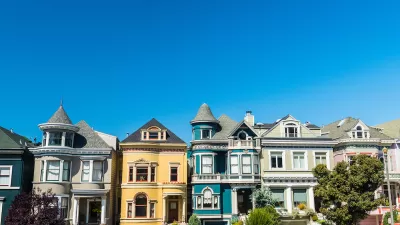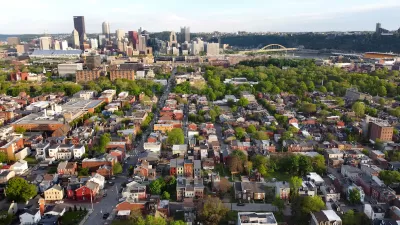A planned New Urbanist development in Northern California wants enable its eventual residents to live within their prescribed ecological footprint.
"Of the choices available to new-home buyers, one of the smallest footprints could belong to a house in a New Urbanist community -- that is, one that follows the planning philosophy that models new suburban developments on older, walkable city neighborhoods. With its mixed-use land planning, shopping areas are within walking distance of most houses, so residents can use their cars less. When such a development adjoins public transportation, many two-car households get rid of one car.
To achieve true one-planet living, however, requires more. Fossil fuels would not be used, so the energy for heating, air conditioning and electricity would be produced by on-site renewable sources. To conserve local water sources, rainwater would be stored, treated and recycled. To the extent possible, building materials would be locally manufactured with recycled content.
Achieving all this community-wide would be considered impossible by most land developers and home builders. But it has been done in England by the BioRegional Development Group, which is now working with a U.S. developer.
That developer, Codding Enterprises, based in Rohnert Park north of San Francisco, is in the final planning stages of what promises to be America's first one-planet-living community, Sonoma Mountain Village. Construction is expected to begin next year and end in 2021. The eventual population is projected at about 5,000."
FULL STORY: In California, Building a Town With a Gentle Footprint

Planetizen Federal Action Tracker
A weekly monitor of how Trump’s orders and actions are impacting planners and planning in America.

Restaurant Patios Were a Pandemic Win — Why Were They so Hard to Keep?
Social distancing requirements and changes in travel patterns prompted cities to pilot new uses for street and sidewalk space. Then it got complicated.

Maui's Vacation Rental Debate Turns Ugly
Verbal attacks, misinformation campaigns and fistfights plague a high-stakes debate to convert thousands of vacation rentals into long-term housing.

In California Battle of Housing vs. Environment, Housing Just Won
A new state law significantly limits the power of CEQA, an environmental review law that served as a powerful tool for blocking new development.

Boulder Eliminates Parking Minimums Citywide
Officials estimate the cost of building a single underground parking space at up to $100,000.

Orange County, Florida Adopts Largest US “Sprawl Repair” Code
The ‘Orange Code’ seeks to rectify decades of sprawl-inducing, car-oriented development.
Urban Design for Planners 1: Software Tools
This six-course series explores essential urban design concepts using open source software and equips planners with the tools they need to participate fully in the urban design process.
Planning for Universal Design
Learn the tools for implementing Universal Design in planning regulations.
Heyer Gruel & Associates PA
JM Goldson LLC
Custer County Colorado
City of Camden Redevelopment Agency
City of Astoria
Transportation Research & Education Center (TREC) at Portland State University
Jefferson Parish Government
Camden Redevelopment Agency
City of Claremont





























